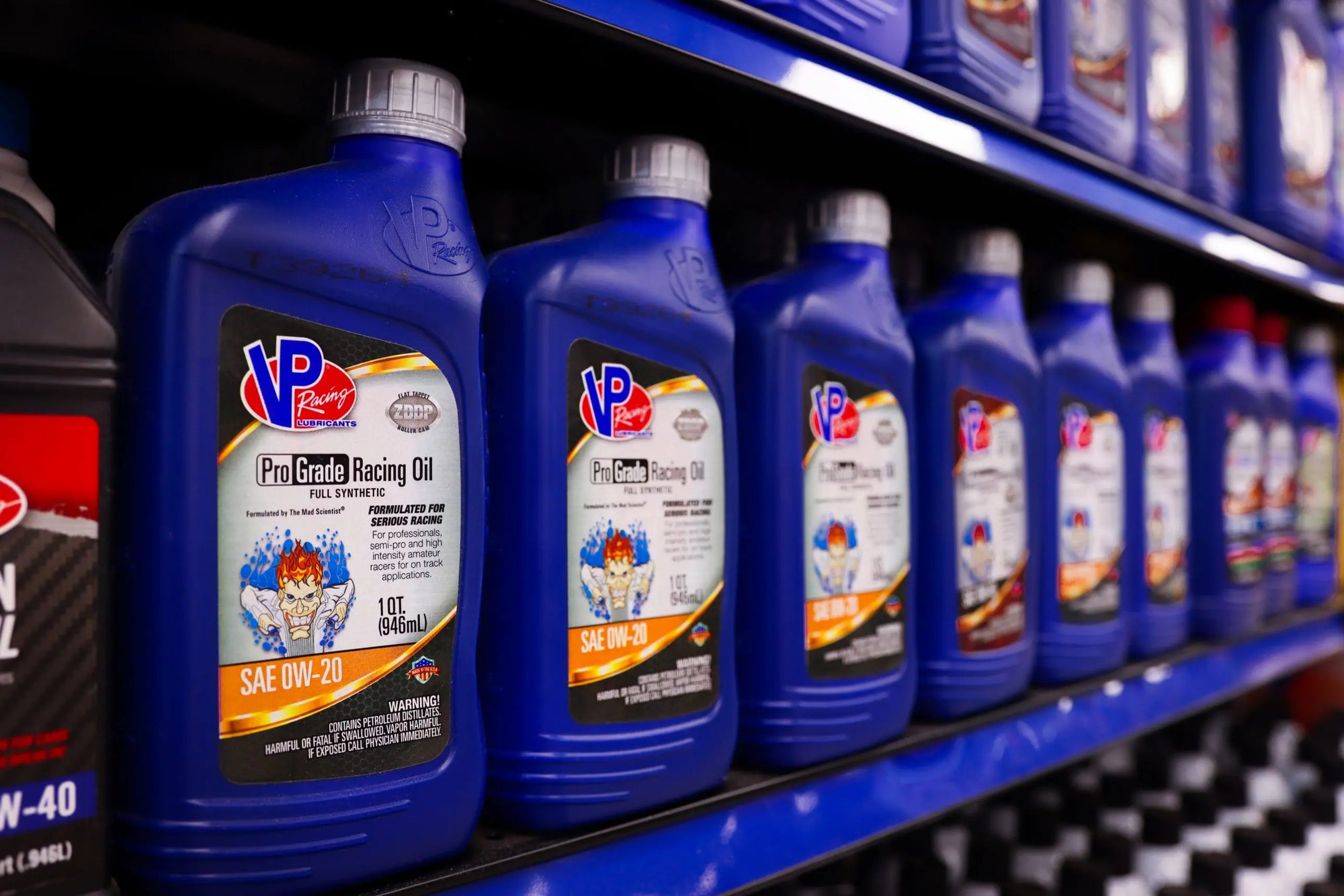Should I Use Synthetic Oil, Conventional Oil, or Synthetic Blend?
Estimated reading time 9:00
When choosing the right motor oil, understanding the benefits of synthetic oil vs. conventional oil vs. synthetic blend is essential. Each type offers unique advantages tailored to different driving habits and engine needs. Regular oil changes also play a vital role by removing contaminants that build up over time, ensuring your engine performs better and lasts longer.
Selecting the right motor oil is one of the most important decisions you can make for your engine’s health and performance. Let’s dive into the key differences and benefits of synthetic oil, conventional oil, and synthetic blends to help you make an informed decision.
Motor oils are designed for a variety of applications, from passenger cars to high-performance vehicles, and even specialized oils for race cars. Several factors, such as driving conditions and vehicle type, determine whether conventional, full synthetic, or a synthetic blend is the best choice for your engine.
What Does Oil Do In A Car?
Engine oil is the lifeblood of your car, playing a crucial role in keeping your engine running smoothly. But why should you care about understanding oil types? Choosing the right oil can improve engine performance, extend its life, and even save you money over time. Whether you're commuting, towing, or pushing your vehicle to its limits, understanding oil basics ensures your car stays in peak condition.
A vehicle engine operates at low temperatures. But, it can operate at very high temperatures, sometimes extreme. Besides lubrication, engine oil has many other important functions:
- Reduces engine wear
- Keeps engine parts cool
- Prevents deposits from forming on internal engine parts
- Suspends and remove contaminants in the oil
- Protects the engine across a wide range of temperatures
- Provides optimal fuel efficiency
- Conditions seals
When comparing synthetic vs conventional oil, they have four primary functions.
Those functions are lubricate, protect, cool, and clean.
What's the Real Difference Between Synthetic Oil vs. Conventional
All motor oils may look alike at first glance, but there are notable differences between synthetic and conventional oils. Here's a breakdown of their key differences:
- How they’re refined
- The additives they use
- Their performance.
Let’s dive a little deeper into the differences between conventional, synthetic, and semi-synthetic oils.
What Is Conventional Oil?
Conventional oil is a mineral-based oil that comes out of the ground (crude oil). They process it through a refinery. Base oils fall into one of several oil grades, ranging from Group I to Group V.
Conventional base oils are classified as Group I or Group II oils. Group I is solvent-refined while they refine Group II oils by hydrocracking. Hydrocracking adds hydrogen under high pressure with a catalyst. The process breaks the hydrocarbon molecules into simpler molecules.
Both Group I and Group II base oils have a lower viscosity index than Group III, IV, or V.
Understanding the Types of Synthetic Oil: Group III, IV, and V
They invented synthetic oil in the late 1920s. The term “synthetic” doesn’t mean that it’s derived from man-made ingredients, as the name implies. “Synthetic” is a marketing term. They make synthetic oil from natural ingredients, usually crude oil. They also use high-quality base oils treated with chemicals.
The process cleans up the molecules. It makes them almost the same size, shape, and structure. They also include additives that enhance the oil’s performance. Synthetic oil falls into the Group III, IV, and V base oil categories.
- A Group III synthetic oil is more refined through hydrocracking than a Group II base oil. The refining process is also longer, resulting in a purer base stock.
- A Group IV base stock is a polyalphaolephin (PAO). This is the most common synthetic base oil for industrial and automotive lubricants.
- Group V base oils are polyalkylene glycols (PAGs) and various esters. They rarely blend a complete Group V product. Instead, it’s used as an additive to enhance the performance of a Group III or IV base oil.
- Group III, IV, and V base oils all have a higher viscosity index than Groups I and II. This means the viscosity changes less during startup and operation as the temperature changes. The oil is more stable. Plus, these base oil groups resist oxidation, thermal breakdown, and oil sludge. They may also improve horsepower and torque.
Now that you have a better understanding of conventional vs. synthetic oil, let’s discuss full synthetic oil vs synthetic blend.
Synthetic Oil vs Synthetic Blend
There is a difference between full synthetic oil vs. synthetic blend. Synthetic blend, or semi-synthetic, is a combination of mineral (conventional) and synthetic base oils. Synthetic-blend oil provides added resistance to oxidation and has outstanding low-temperature properties. It’s cheaper to buy than a full synthetic and affords better performance compared to a straight conventional oil.
There isn’t a set formula for synthetic blend oils. One may contain Group 1 or Group II base oils with a Group III, IV, or V synthetic. Another might blend a Group III and Group IV synthetic. It depends on the manufacturer.
Also, some synthetic blends may contain only 5% or 10% synthetic. Another brand might have 50% synthetic in its blend.
How to Choose Between Synthetic Blend vs. Full Synthetic Oil: What's Best for Racing Engines?
So, what’s the difference between full synthetic oil and synthetic blend? Is full synthetic better? It depends on the application. A full synthetic oil provides excellent low-temperature and high-temperature performance. It has great oxidation stability and many other performance advantages.
However, it may not be ideal for everyone. For example, some race car engine builders prefer a synthetic blend or conventional oil. Why? They feel a full synthetic is too slippery and doesn’t stay on the upper part of the engine (flat tappet, cam roller) as well. The mineral base in a semi-synthetic or conventional oil provides better clingability in those areas.
Cost is another factor. A synthetic blend oil is much less expensive than a full synthetic. You should look at what the OEMs recommend for your particular vehicle.
Can You Mix Synthetic and Conventional Oil?
Yes. Mixing synthetic and conventional oil is fine. Years ago, there was concern about the esters used in synthetic oil. In most circumstances, you can add semi or full synthetic oil to your conventional oil. Check the label on the oil bottle because it will say if it’s mixable with conventional oil. Also, refer to your owner’s manual when in doubt.
Can You Switch Between Regular & Synthetic Oil?
What happens if you use conventional oil instead of synthetic, or vice versa? Can you switch between them? In most cases, it's safe to switch between the two.
Before you do, check the label on the oil bottle to ensure it’s safe to do so. Also, be sure to refer to your owner’s manual. In the old days, there was concern that some synthetics weren’t compatible with mineral-based oils. That has changed over the years.
Suppose you’ve used conventional diesel oil for a long time. If you switch to synthetic, it might cause short-term leakage due to the thinness of synthetic oil and the additives in it. Those additives might differ from your conventional oil. Synthetic oil can actually clean some of the engine deposits, which could cause leakage. It usually resolves over time.
Is Synthetic Oil Worth the Price?
What are the disadvantages of synthetic oil? When it comes to deciding between synthetic or conventional oil, price is another important point to consider. Full synthetic oil costs a bit more than a synthetic blend oil. It costs a lot more than regular conventional oil.
In fact, an American Automobile Association (AAA) survey revealed some interesting information: The average cost of a conventional oil change is nearly half that of a full synthetic oil change. There could be an even bigger difference depending on where you take your vehicles for oil changes and the brand of oil you choose.
If you change your own oil, you'll pay roughly double the amount for fully synthetic oil.
So, is synthetic worth it? Which is better, synthetic or conventional oil? It depends on the application. For passenger cars and trucks, full synthetic oil provides many advantages.
Full synthetic motor oil has several characteristics:
- It’s more highly refined
- It offers a naturally higher viscosity index
- It’s less prone to chemical degradation compared to conventional oil
- It provides better high-temperature protection and offers a longer lifespan than conventional oil.
Conventional engine oil eventually forms sludge from engine deposits. By comparison, a full synthetic oil resists sludge and deposit formation.
Many newer cars have tighter engine clearances. These tighter clearances need a lighter-viscosity (thinner) oil. Fully synthetic oil provides better low-temperature and high-temperature performance. This is even more important when using low-viscosity oil.
AAA also conducted research to understand the differences between conventional and synthetic engine oils. Their lab tests showed synthetic engine oils outperformed conventional by 47 percent!
When deciding between synthetic vs. conventional oil, it’s always best to consult your owner’s manual and follow the OEM recommendations. Many auto manufacturers will void your warranty if you use an oil they don’t recommend.
How Long Can You Go Without an Oil Change?
What about synthetic oil vs regular oil mileage? Full synthetic usually lasts longer under comparable driving conditions. How long you can go without an oil change depends if you're using a full synthetic oil.
Do you do a lot of stop-and-go driving? Do you make a lot of quick trips that don’t allow the engine to reach full operating temperature?
Another key point is while the base oil in a full synthetic tends to last a long time, the additives in oil deplete over time because of your driving habits and the condition of the engine. For instance, is fuel getting into your oil? Does your engine always run hot? Are your rings in good shape? Are you getting complete combustion?
Additionally, if you own a vehicle and don’t drive it often, change your oil at least twice a year, especially in November, before winter starts. Always keep fresh oil in an engine that doesn’t get used often. Fresh oil helps control rust or moisture that could form and invade your engine during the winter.
Some people like to change their oil every 3,000 to 5,000 miles because it gives them peace of mind. Our advice is to follow what your auto manufacturer recommends. If they say you can go 7,500 miles between oil changes, you’re safe to do so. That’s assuming you don’t drive under extreme conditions.
Where Can I Buy VP Motor Oil?
VP Racing offers a full line of premium engine oils for street cars, high-performance vehicles, and racing engines. Our oil blends utilize the same cutting-edge technology we use in our specialty fuels, ensuring top-tier protection and performance.
If you haven't already checked out part 1 of our mini series on engine oil, discover why oil viscosity is the most important physical property in engine oil. And be sure to check out why Joe Gibbs Engines trusts only VP Racing oil in their off-road engines.



